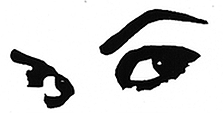
What are learning disabilities?
Learning disabilities are problems a child has when doing certain tasks. These tasks include reading, writing, math, listening, speaking or concentrating. Learning disabilities are not caused by eye problems. Children with learning disabilities do not have more vision problems than children without learning disabilities. Instead, a learning disability is caused by problems with how the brain processes what it sees or hears.
A child with a learning disability processes what they read and hear differently. Normally when we read the brain connects the words we see with their meanings and familiar experiences and information. Children with learning disabilities struggle to process these connections.
Causes of learning disabilities
Often the cause of a learning disability is not known. However there are certain risk factors for having a learning disability. They include:
- having family members with learning disabilities (inherited)
- being born prematurely
- experiencing physical stress before or after being born
- infection in the central nervous system, such as meningitis.
- having a severe head injury
Despite what some people think, poor vision, focusing problems, jerky eye movements, and crossed eyes do not technically cause learning disabilities; however, having smooth aligned focused eyes are necessary for prolonged comfortable vision.
Learning disability signs
About 15 out of 100 children have a learning disability. Children may not show signs of a learning disability until they start going to school. Parents, caregivers and teachers might notice these children have:
- trouble learning to read
- lack of enjoyment from or interest in reading
- trouble in math
- difficulty organizing thoughts and information
Personality and behavior changes may develop in children with learning disabilities. For example, they might lose interest in school, become frustrated easily, develop behavior issues at school or become anxious or depressed.
Testing for learning disabilities
Parents or guardians who wonder if their child might have a learning disability should talk with that child’s teacher and/or pediatrician. Learning disability specialists and other professionals will test your child. In many places, it is the law that schools must test children who might have learning disabilities.
While a learning disability is not due to eye problems, these children should have a full eye exam by an optometrist.
There is no quick fix for a learning disability. But there are qualified professionals who can help.
Beware of people or products that claim to offer simple or quick fixes for learning problems.
Instead, qualified educators and reading specialists are able to provide the support and guidance your child needs. Time and patience (for both children and parents) are important for success.
Treating learning disabilities
After getting a full eye exam by an optometrist, trained educators and reading specialists can help children with learning disabilities succeed in school. With their help, these children will learn special skills and strategies to adapt to learning.
Tags: childrens vision, learning disabilities, reading